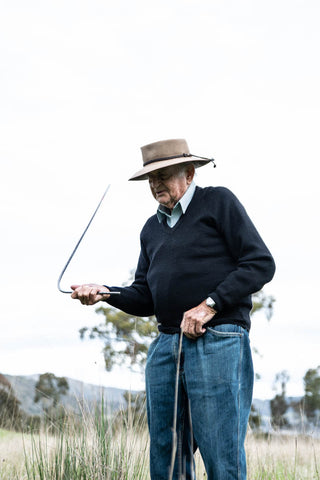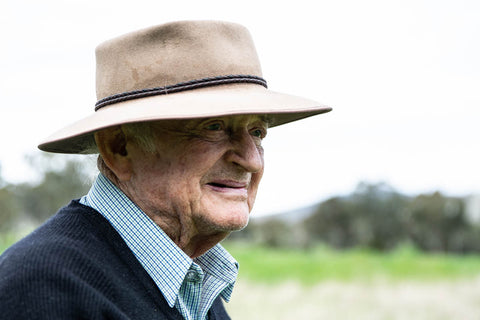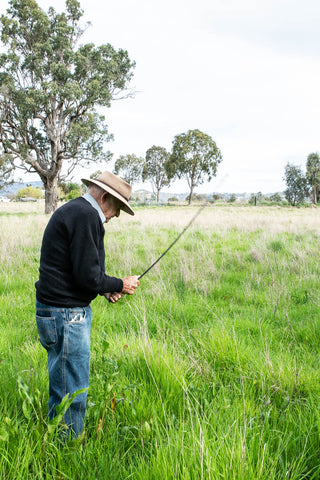The gift - Ivan Inman, Water Diviner





Dressed in an Akubra hat, long-sleeved shirt, and jeans, 93-year-old Ivan Inman walks in a paddock, a length of metal rod rotating quickly in his hand, a crop duster aerial forcefully flicking through the air, or a steel bolt circling from a short length of frayed baling twine.
Ivan is demonstrating the skill of divining, looking for underground water, to give a drilling team a better idea of where to drill a bore or well, and at what depth.
The term water divining might conjure ‘The Water Diviner’ film directed by and starring Russell Crowe. When his character Joshua Connor is asked how he finds water that seeps through cracks in the earth underground he explains, ‘…well there’s the trick, you have to feel it…’
Ivan’s skills are in strong demand in rural areas where the worst drought on record remains a fresh scar in people’s memories and they dread the return of drier than usual El Nino weather conditions. Water security is top of mind for farmers and townies alike, who rattle off dam levels and rainfall figures with great familiarity and interest. It’s that important. Their livelihoods and communities depend on it.
In 2019 artist Fintan Magee chose a water diviner as a bush icon to paint a 40-metre-high mural on three grain silos at Barraba, again in north-west NSW, now part of the Australian Silo Art Trail Collection.
Demand for water sees Ivan travelling hundreds of kilometres in any given week to visit properties from the Upper Hunter to the Queensland border. In one six-year period he travelled 300,000km. He looks for water for drillers to sink bores to provide water for livestock, or irrigation for broadacre crops like wheat and cotton.
He loves the travelling. It is not unusual for him to leave home at 2am, drive five hours through the night and then divine six bores in one day. He says he doesn’t overcharge because he has all that he needs, three landowners sharing the $300 bill for an upcoming job.
Ivan recalls his first exposure to water divining through his father George Inman. As a 10-year-old kid Ivan would travel his father in a horse and sulky from their home at Nundle to properties divining maybe once or twice a year. He says he might have been first paid for divining in his twenties and fitted it in on weekends between full-time work farming, truck and dozer driving, and green keeping.
“I never ever advertised. People just found me by word of mouth. That’s how it went. People knew I could do it so they just passed the word around. You get a name for it,” Ivan says in his inter-war, pre-Depression era modest disposition.
It’s a skill that’s taken him to four states, his home state NSW, Victoria, Tasmania and Queensland. He estimates he’s divined about 5,000 bores throughout his life and says one driller reckons he has a 98 per cent success rate for them and they don’t like drilling bores that Ivan hasn’t divined. The jobs are recorded in books filled with names, and there are more names he never wrote down.
Some diviners use L-rods, forked sticks or pendulums to help them look for water, others responding to patterns in the movement of their tools.
“I used to use a Number 8 wire [British Standard gauge] years ago, until my hands weren’t gripping good enough so you get a false reading. I had this quarter inch rod at home and I just bent it,” Ivan says.
When he’s divining Ivan likes to look around and observe the lay of the ground. He can end up walking for several kilometres, but doesn’t usually notice the distance because he’s concentrating on what he’s doing. It’s when he’s back home at Nundle, or staying with his granddaughter at Nabiac, fatigue sets in and he can find himself in bed at 7.30pm when his son tries to phone him.
Ivan says he’s not a talker, but he’s happy if a landowner wants to join him and talk as he walks, observing any rock formations that might inform his work. He doesn’t feel anything physical when he is divining, it is the movement of the rod that indicates the presence of an underground stream.
“I ask the person where they want water, like close to electricity, and there might be nothing. There’s places where you can’t get water.
“When I find a good pull, I look for a cross stream. I don’t feel nothing in the body, just the movement of the rod. At the edge of it, it goes one way, and when I hit the middle, it spins the other way.
“If I find a stream and it’s not wide enough, well you don’t worry about it. If I find a stream that’s 60-100 metres across it, well it’s worth having a go.”
Reflecting on the recent three-year drought, Ivan agrees it was one of the longest he’s lived through. He witnessed desperation, with sheep and cattle in poor condition, and landowners exhausted from carting feed and water to livestock.
“The drought was getting worse and worse and people wanted water. That’s the way Australia is, you either get lots of rain, or no rain.
“If you haven’t got water, well you’re dead. Even camels got to have it.”
Ivan is not always on a property when the drillers find the bore water he’s led them to, but he was divining at Gravesend in the state’s north-west and the property owners were extremely grateful that he’d found water after they’d previously drilled three dry holes.
“When I came back from breakfast the lady of the place smothered me in kisses and cuddles. I didn’t think I could come up for air.”
Ivan has tried to pass water divining on to his children and grandchildren. “I tried them, but they haven’t got it.” It saddens him to have doubts about water divining continuing, but he’s grateful to have a loving family and considers himself “one of the luckiest men alive”.
He knows of other water diviners, but doesn’t know any well. He recalls a fellow from nearby Quirindi who spent some time with him wanting to learn water divining, but he doesn’t know if he kept it up. He hopes he did.
He’s pleased to use his skill, even at 93. “If I’m not doing something I feel like I’m loafing. What the hell am I here for if I can’t do something.” His strong work ethic has meant he’s never been out of work, but he puts his longevity down to pure luck.
Ivan laughs at the thought that water divining could be considered supernatural or in another time, even witchcraft.
“I’m just lucky I can do it, and while I can do it successfully, I’ll keep doing it.”
Postscript: Ivan is no longer working. However, he found an apprentice Dee Humbles, from Hanging Rock, near Nundle, who he recognises as also having the gift.




Megan Trousdale
Author